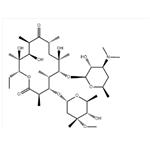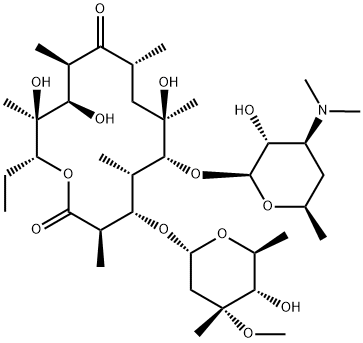What are the side effects of Erythromycin?
Aug 19,2024
Introduction
Erythromycin is a conventional antibiotic that binds bacterial ribosomes and inhibits protein synthesis. This bacteriostatic mode of action inhibits the replication (growth) of bacteria during infection. Erythromycin, a medically necessary antibiotic, was discovered in 1952 in the actinobacterium Streptomyces erythreus (renamed Saccharopolyspora erythraea in 1987). This microbe then became the biosynthesizer for the industrial production of Erythromycin, a practice that remains to this day.

History
Erythromycin, the first-generation macrolide antibiotic, was founded by Eli Lilly Corporation. As Erythromycin has a low bioavailability and it’s poor tolerance, Taisho Pharmaceutical developed the second generation macrolide antibiotic-Clarithromycin. At this time, Taisho Pharmaceutical transferred the possession of Clarithromycin to Abbott Laboratories. In 1998, Hoeehst-Roussell successfully developed another macrolide antibiotic-Roxithromycin. In the treatment of infectious diseases, pharmaceutics of Erythromycin, Clarithromycin, Roxithromycin, and Azithromycin are widely used in clinics. At same time, because we frequently use Erythromycin antibiotics or abuse causing bad results of un-tolerance. Now, pharmacologists are devoted to developing new-generation macrolide antibiotics, which have better therapeutic effects and are more tolerant to bacteria[1].
Side effects
These common side effects of Erythromycin happen in more than 1 in 100 people:
Feeling sick (nausea)
Being sick (vomiting)
Diarrhoea
Stomach cramps
Loss of appetite
Bloating and indigestion
Serious side effects
Serious side effects are rare and happen in less than 1 in 1,000 people:
a skin rash
severe stomach pain – this can be a sign of pancreas problems
yellowing of whites of the eyes or the skin (although this may be more difficult to see on brown and black skin), or pale poo with dark pee – these can be signs of liver or gallbladder problems
seeing or hearing things that are not there (hallucinations)
ringing in the ears, temporary hearing loss, or feeling unsteady on your feet
a high temperature
References
[1] Xin Yue. “The mud-dwelling clam Meretrix petechialis secretes endogenously synthesized erythromycin.” Proceedings of the National Academy of Sciences of the United States of America 119 49 (2022): e2214150119.
- Related articles
- Related Qustion
- What is Erythromycin? Mar 15, 2022
Erythromycin (CAS: 114-07-8), thereafter renamed erythromycin A, was first isolated at Eli Lilly from a strain of Streptomyces erythreus. It is the first representative of the class of macrolide antibiotics introduced for clinical use.
In vitro, 5-ASA shares many pharmacological properties of non-steroidal anti-inflammatory drugs (NSAIDs) such as aspirin.....
Aug 19,2024Organic AcidsDiclofenac sodium is a commonly used non-steroidal anti-inflammatory drug (NSAID) with antipyretic, anti-inflammatory and analgesic properties.....
Aug 19,2024DrugsErythromycin
114-07-8You may like
- Erythromycin
-

- $0.00 / 1Kg/Bag
- 2024-08-19
- CAS:114-07-8
- Min. Order: 1Kg/Bag
- Purity: 0.99
- Supply Ability: 20 tons
- Erythromycin
-

- $0.00 / 15kg
- 2024-08-19
- CAS:114-07-8
- Min. Order: 15kg
- Purity: 99.0%
- Supply Ability: 10tons
- Erythromycin
-

- $159.00 / 25KG
- 2024-08-16
- CAS:114-07-8
- Min. Order: 25KG
- Purity: 98%
- Supply Ability: 1-10mt





